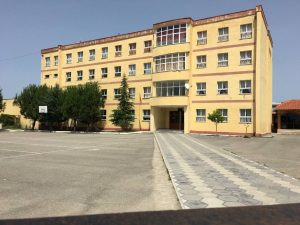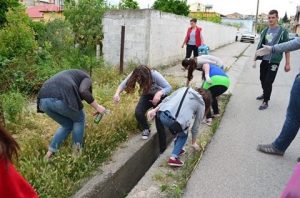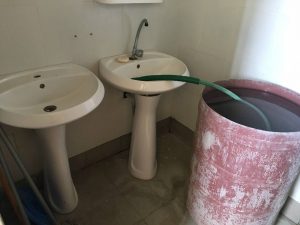This project is made possible through the partnership of WATER CHARITY and the NATIONAL PEACE CORPS ASSOCIATION. ![]()
Location
Shijak, Durres, Albania
Community Description
Shijak is a town outside of Durres, the second-largest city in Albania. It has a long history, as Durres used to be the capital of Albania and has remained from the Byzantine era. The community is quite tight-knit and it seems like one giant family.
A lot of the locals of Shijak have immigrated to Italy, and most people want to leave Albania, especially the youth.
Shijak is a relatively progressive town thanks to its proximity to the large cities of Durres and the capital Tirana, but still traditional and highly patriarchal. Often women are not seen out, or confined to meet at one café, lest they are talked about by others in the community, because of it’s tight-knit nature.
Gjimnaz 16 Shtatori is one of two high schools in the Shijak municipality with about 500 students per year. A majority of students come from the surrounding villages, while some live locally in Shijak.
Problem Addressed
The high school has 3 floors, with bathrooms for boys and girls, with 3 stalls each, totaling 18 stalls. However, due to plumbing issues, the third-floor bathroom is locked and unused to prevent flooding in the lower 2 toilets.
The second-floor bathrooms are reserved for the staff of 29, leaving only the first-floor bathrooms for all 500 students. This is incredibly problematic as this means 3 toilet stalls for each gender.
In addition, the first floor is unusable because of the bad odor coming from the bathrooms due to the sheer number of students using the handful of toilets. There is flooding about once a month on the first floor, which is unsanitary, and at such times, the bathrooms cannot be used at all.
In addition, the toilets are not attached to the running water meaning students must flush with a bucket of water that is left filled in the bathroom. About half of the sinks are non-functioning due to missing parts, and there are no lights.
 Project Description
Project Description
This project is to renovate 6 bathrooms at the high school.
Water Charity funds will pay for the materials.
The Bashkia will provide the manual Labor, with employees from the municipality. They will fix the sewage pipe that leads out of the school because it is half blocked.
All sinks will be repaired if possible, or, if not, replaced as necessary. Cisterns will be put in each toilet stall.
Project Impact
500 people will benefit from the project.
Peace Corps Volunteer Directing Project
Margret Chu
Monitoring and Maintenance
The bathrooms will be maintained by the two cleaning staff. They will clean the bathrooms during classes, after students have had their bathroom breaks, and they will refill the soap, as well as wash the towels that students use for drying their hands.
Comments
In replacing the drainage pipe, the unhygienic monthly flooding of the bathrooms will cease and the third-floor bathrooms can be opened and used, doubling the number of bathrooms available for the students.
 Let Girls Learn
Let Girls Learn
Girls and teachers avoid drinking water so that they don’t have to use the school bathrooms during this school day, which can cause dehydration. During the menstrual time of girls, they tend to stay home, because it is uncomfortable and unhygienic in the school bathrooms, causing them to miss a week of school each month.
The girls then fall behind. In Albanian society, it is already tough on girls wishing to pursue higher education, as there is pressure to drop out and remain in their village to work or get married early.
This is an official Let Girls Learn project, falling into Water Charity’s Let Girls Learn Initiative, a grouping of projects that have a pronounced element involving helping girls go to, and stay in, school. This project is also part of the 100 Water Projects Program – Albania.
The project promotes girls’ empowerment and education, as fixing up the bathrooms to create a more sanitary space for girls to use the bathroom will stop them from leaving the school to use the bathroom or missing school for a week each month so that they can continue with their education.
This project was determined to be infeasible, and there was no expenditure of funds.